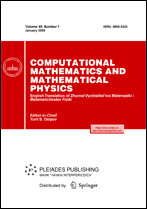|
This article is cited in 3 scientific papers (total in 3 papers)
Application of matrix decompositions for matrix canonization
V. G. Volkov, D. N. Demyanov
Naberezhnye Chelny Institute, Branch of Kazan Federal University, Naberezhnye Chelny, 423812 Russia
Abstract:
The problem of solving overdetermined, underdetermined, singular, or ill conditioned SLAEs using matrix canonization is considered. A modification of an existing canonization algorithm based on matrix decomposition is proposed. Formulas using LU decomposition, QR decomposition, LQ decomposition, or singular value decomposition, depending on the properties of the given matrix, are obtained. A method for evaluating the condition number of the canonization problem is proposed. It is based on computing the norm of the matrices obtained as a result of canonization; this method does not require the original matrix to be inverted. A general step-by-step matrix canonization algorithm is described and implemented in MATLAB. The implementation is tested on a set of 100 000 randomly generated matrices. The testing results confirmed the validity and efficiency of the proposed algorithm.
Key words:
system of linear algebraic equations, matrix canonization, tablet method, singular value decomposition, QR decomposition, LQ decomposition, LU decomposition, condition number, nullspace, row space, column space.
Received: 04.03.2019
Revised: 04.03.2019
Accepted: 08.07.2019
Citation:
V. G. Volkov, D. N. Demyanov, “Application of matrix decompositions for matrix canonization”, Zh. Vychisl. Mat. Mat. Fiz., 59:11 (2019), 1823–1835; Comput. Math. Math. Phys., 59:11 (2019), 1759–1770
Linking options:
https://www.mathnet.ru/eng/zvmmf10976 https://www.mathnet.ru/eng/zvmmf/v59/i11/p1823
|


| Statistics & downloads: |
| Abstract page: | 364 | | References: | 17 |
|





 Contact us:
Contact us: Terms of Use
Terms of Use
 Registration to the website
Registration to the website Logotypes
Logotypes







 Citation in format
Citation in format 
